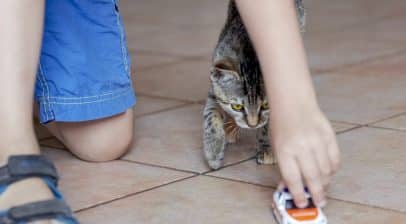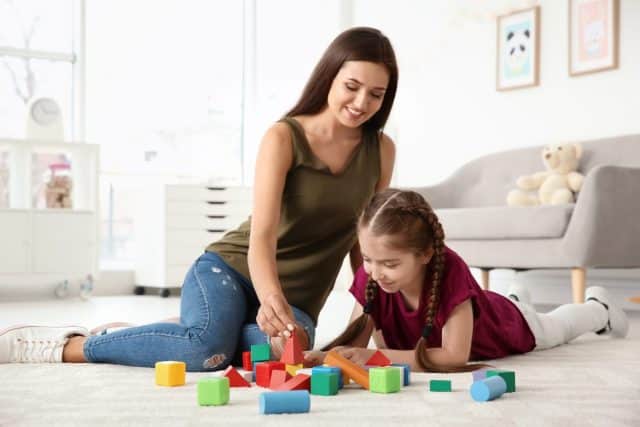
15 April 2020 – One of the hardest things for many families during the COVID-19 national lockdown are the school closures.
This sudden change in routine can have a huge impact on all our children but may be especially difficult for an autistic child.
Their life suddenly has become a lot less busy and they don’t know what to do with this spare time.
The familiar routines have been abruptly disrupted, not just for them but for other family members as well.
Why doesn’t dad go to work anymore?
Why can’t I go to my favourite shop?
This can cause some behaviours that we find challenging such as repetitive questions, repetitive behaviours and meltdowns.
You may also be worried that your child is missing out on essential learning opportunities while they are not at school.
Strategies to support children on the autism spectrum during lockdown
Intensive interaction
Intensive interaction is a strategy to provide learning opportunities for our autistic children.
Step 1: Watch your child when they are doing an activity repeatedly, such as moving a toy car back and forth.
Step 2: Copy their actions. Get another toy car and move it back and forth.
Step 3: Now add a new element to the game, such as a cardboard box as a slope. Drive your toy car to the top of the slope and watch it slide down.
If the child accepts this new element, we have extended their game. Otherwise, we can prompt them by pushing the box closer to encourage them to have a turn with their toy car down the slope.
We can do this with all the repetitive games our children are playing to teach them new skills.
Routine-based games and activities
Most children on the autism spectrum prefer routines. We can design different routine-based activities to encourage their learning.
Step 1: Set a goal. Think about what you want to teach. Usually it is better to start with a social activity that does not involve an object. The goal of such an activity is prompting social skills, such as a nursery rhyme game or action song like Head, Shoulders, Knees and Toes.
Step 2: Write down all the actions and words and decide who will do what. For example, you can sing the “heads shoulders” song and they can point to what you name. Or they can join in singing some parts of it. Or they can sing it and you can point to your own body parts.
If the game involves learning some new skill, you might need to prompt these skills, either by showing them what to do and asking them to repeat, or by telling them what you want them to do.
To help with the flow of the activity, you can take photos of each step and put them in order. Then as you go through the game, point to each step.
You can also design an activity in which there is an object involved. This is harder than a social game as it also involves joint attention skills, which is often hard for children on the autism spectrum.
Try playing board games, taking turns doing a puzzle together, running and throwing balls in a basket, or taking turns to colour in.
With this kind of activity also you’ll need to plan each step in advance, as well as what you want your child to do and what skill you want to teach. Again, start with the things your child can do so they get to experience success quickly.
You might do all the early pieces of a puzzle and let them put the last piece in, so they get the fun of completing it.
We also need to keep in mind that the impact of these changes in a child’s daily routine is huge and as we know autistic children typically don’t cope well with change.
Strategies to support children during this time of change
-
Understand this is a big change and they might struggle doing their usual tasks.
-
Understand you might need to teach them the skills that they already have at school, such as putting their lunchbox away after finishing their meal, or more academic skills such as drawing, reading, etc.
-
Try to keep the overall structure of the day as close as possible to an ordinary school day. For example, keep mealtimes, bedtime, shower time at the same time.
-
Create a visual routine at home to give them a sense of structure. Introduce the routine at the beginning of the day in a visual way (take photos of the plan that you have for a day and put them in order). Then as you go during the day, keep referring to it, so that your child still knows what to expect next.
-
Use pictures to show your child what they need to do (for example, take a series of pictures around brushing teeth, washing hands. Ideally these will be pictures of your child, but you can also use photos of other family members, or your child’s favourite superhero). This helps take the load off their working memory and helps with their executive functioning.
-
Be ready to answer any questions that your child might have as many times as they ask. The novelty and uncertainty of the situation also can have a huge impact on the mental health of the child. We need to understand this impact and try to clarify the situation and answer questions. This is a stressful time and asking the same question repeatedly might be your child’s coping mechanism.
Strategies to encourage positive social interactions
Another change that may be impacting your child is the reduction in social interactions during lockdown. Your child may feel unsafe due to the fast-changing situation. All children need to have close social interactions to feel safe and develop their skills.
-
Spend some (about 45 minutes) one-on-one time with them can reduce this feeling of being unsafe. Follow your child’s lead and avoid any instructions. This way we are reassuring our children that there is always an adult who is responsive to their needs regardless of any external stressor. They can be sure they don’t need to act in certain way or follow any instruction to be loved and cared for.
Note: this one-on-one time is separate from the teaching time that we discussed earlier in this article. So, it is not about teaching any skills, but just about giving a sense of mental safety for your child.
- Sanam Bagherian is autism specialist facilitator, has a strong interest in autism and has a Ph.D. in autism psychology which included delivering educational programmes to support parents with children on autism spectrum.




